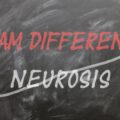What are strengths, and what are not?
Why do we find it difficult to name our strengths?
Our culture brings with it a “guilt pattern” from history. Misconduct, failure, omissions – all are ascribed to a guilty party, who has to “pay” for this. Internally, the unconscious criminal tribunal of guilt against weakness is associated with flaming hot feelings of embarrassment and fear.
In the past, joy usually had to wait until eternal bliss. And bliss had to be acquired through virtuous lifestyle and renunciation of consumption and enjoyment.
“The most fun things in life are either immoral, illegal or they make you fat.”
In addition to this, our education, our job and self-help books keep demanding from an early age not to brag, to learn from mistakes, to be humble. Boasting and arrogance are often successful professionally, yet never much liked anywhere.
As a result, many people find it extremely difficult to make statements about their own character, and especially about their strengths.
What are strengths?
Character strengths and virtues are core characteristics of human existence. Philosophical and religious thinkers have suggested various virtues throughout history, which are believed to have a universal character. The following virtues occur again and again in the various thought systems of history: wisdom, courage, humanity, justice, moderation and transcendence.
Character strengths are psychological characteristics – processes or mechanisms – that define virtues.
In other words, strengths of character are distinguishable ways to exercise or develop one or more virtues. They are part of a person’s personality. It is believed that strengths of character are relatively stable over various situations and over time. However, they can change as a result of different life experiences.
After psychology has dealt for a long time only with disorders and their treatment, positive psychology takes up scientific research into optimal human functioning. It is about understanding and promoting factors and processes that allow individuals and communities to live a “good life”.
According to Seligman and Csikszentmihalyi, there are three areas of particular interest:
(1) positive subjective experiences (e.g. happiness, life satisfaction),
(2) positive individual personality traits (e.g. honesty, bravery) and
(3) Institutions that enable and promote positive experiences and personality traits.
Seligmann and Peterson developed a questionnaire in 2004 in collaboration with the American Values-In-Action (VIA) Institute for Measuring Strengths. They assigned 24 strengths to six different virtues.
Overview of virtues and strengths
These six virtues are the ones mentioned above: wisdom and knowledge, courage, humanity, justice, moderation, transcendence.
- Wisdom and knowledge: cognitive strengths that involve the acquisition and use of knowledge
Creativity: finding new and effective ways to do things
Curiosity: have an interest in the environment
Judgment: think things through and look at them from all sides
Love of learning: learning new techniques and acquiring knowledge Wisdom: being able to give good advice - Courage: emotional strengths that overcome internal and external barriers to achieving a goal through the exercise of will power
Authenticity: telling the truth and giving yourself naturally
Bravery: do not bow to threat or pain, accept challenges
Endurance: finish what was started
Enthusiasm: meeting the world with enthusiasm and energy.
- Humaneness: interpersonal strengths that enable loving human interactions
Friendliness: doing favors and doing good deeds
Binding ability: being able to create human closeness
Social intelligence: being aware of the motives and feelings of yourself and others - Justice: strengths that promote the community
Fairness: treat all people on the principle of equality and justice
Leadership: Organize and enable group activities
Teamwork: work well as a member of a team - Moderation: strengths that counter excess
Willingness to forgive: to those who forgive those who have wronged them modesty: let what they have achieved speak for themselves
Caution: do nothing or say anything that could later be regretted
Self-regulation: regulate what you do and feel
- Transcendence: strengths that bring us closer to a higher power and make sense
Sense of beauty: Appreciate beauty in all areas of life
Gratitude: being aware of good things and appreciating them
Hope: expect the best and work to achieve it
Humor: laugh and appreciate humor; like to make people laugh
Spirituality: have coherent beliefs about a higher meaning of life
Strengths are not just what we are good at. Strengths form patterns of thinking, feeling and acting that:
- stimulate us and we forget time and space
- allow us achievements and successes for which we are praised
- where we feel good and are central to our identity.
Other more or less close relatives of strengths:
- Values (what is important to me)
- Experiences (what I have behind me)
- Goals (where I want to go)
- Competencies (what i can)
- Resources (what strengthens me)
- Interests (what fascinates me)
Especially in teams, but also in relationships or families, it is not only the individual character strengths that matter, but which strengths are represented how strongly, and which are the ones missing completely. How are the virtues and strengths put into use during real cooperation?
Where does the interplay of strengths (and weaknesses) result in issues needing attention? For example, if all team members relish authenticity, and team communication is strongly influenced by it, sometimes there is a lack of mindfulness or respect for vulnerability. Looking at the strength profile may lead to a constructive attention for all the idiosyncrasies of those involved. This provides a good basis for making viable agreements and developing concepts for collaboration, that can be shared by everyone involved.

Sources:
- Christian Thiele: Stärken stärken im Job
Seligman, M.E.P. (2002). Authentic happiness. Using the New Positive Psychology to Realize Your Potential for Lasting Fulfillment. New York, NY: Free Press
https://www.charakterstaerken.org/
Values in Action website: www.viacharacter.org - Positive Psychology Center (University of Pennsylvania): www.authentichappiness.sas.upenn.edu
- European Network for Positive Psychology: www.enpp.eu
what are strengths



